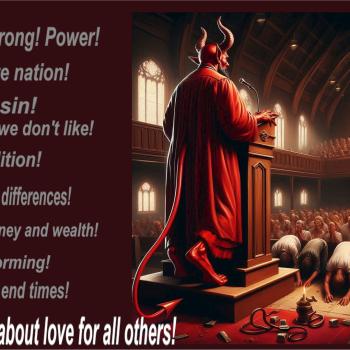Mormons often read this as a promise that our weaknesses will be overcome: if I have a weakness, God will take that weakness from me and make me strong instead. But I don't think that is what the last sentence says. It doesn't say that weaknesses will be taken away, but that what is weak will become what is strong.
That's a very different message, but it is consistent with other things in Mormon scripture. The revelations of the Doctrine and Covenants (a volume in the LDS canon of scripture) repeat that message more than any other of the works in our canon.
In 1841, as Joseph Smith was founding a new, large city in southwestern Illinois, the Lord said to Joseph Smith: "I raised you up, that I might show forth my wisdom through the weak things of the earth" (D&C 124:1). But this was not news to Smith. The 1831 preface to the Doctrine and Covenants, given by revelation, had already told him that the Restoration had been brought about through him so "that the fulness of my gospel might be proclaimed by the weak and the simple unto the ends of the world" (D&C 1:23).
The theme of strength in weakness is central to the revelations received by Smith. Nowhere in his revelations, however, is that theme more forcefully put than in Doctrine and Covenants 121. In 1838 Governor Lilburn Boggs issued an extermination order forcing the Mormons out of the U.S. state of Missouri. One result of that order was Smith's imprisonment in Liberty, Missouri.
While in jail in 1839, during the height of the Missouri persecutions, Smith wrote a letter in which he recorded a revelation he had recently received, partly a response to Smith's plea to God for retribution against the Mormons' persecutors. The revelation, section 121 of the Doctrine and Covenants, is a remarkable call for weakness:
When we undertake to cover our sins, or to gratify our pride, our vain ambition, or to exercise control or dominion or compulsion upon the souls of the children of men, in any degree of unrighteousness, behold, the heavens withdraw themselves; the Spirit of the Lord is grieved; and when it is withdrawn, Amen to the priesthood or the authority of that man. ...
We have learned by sad experience that it is the nature and disposition of almost all men, as soon as they get a little authority, as they suppose, they will immediately begin to exercise unrighteous dominion. Hence many are called, but few are chosen. No power or influence can or ought to be maintained by virtue of the priesthood, only by persuasion, by long-suffering, by gentleness and meekness, and by love unfeigned; by kindness, and pure knowledge, which shall greatly enlarge the soul without hypocrisy, and without guile—reproving betimes with sharpness [i.e. speedily], when moved upon by the Holy Ghost; and then showing forth afterwards an increase of love toward him whom thou hast reproved, lest he esteem thee to be his enemy; that he may know that thy faithfulness is stronger than the cords of death.
Let thy bowels also be full of charity towards all men, and to the household of faith, and let virtue garnish thy thoughts unceasingly; then shall thy confidence wax strong in the presence of God; and the doctrine of the priesthood shall distil upon thy soul as the dews from heaven. The Holy Ghost shall be thy constant companion, and thy scepter an unchanging scepter of righteousness and truth; and thy dominion shall be an everlasting dominion, and without compulsory means it shall flow unto thee forever and ever. (D&C 121:37-46)
The revelation's admonition is to live without compulsion, to be strong in the weakness of love. The promise is that God's blessings and presence will come without compulsion, without the need for any other strength.
Everyone I met last weekend, Mormon and non, was deeply moral and deeply responsible. Each of them was impressive. But no one was more impressive than the one person who remained unmentioned and unnoticed by most of those attending the ceremonies, the person whose loving weakness was most clear and least obvious.





